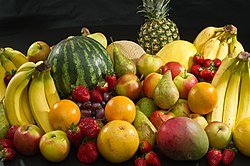果物
Jump to navigation
Jump to search
Japanese
[edit]Etymology 1
[edit]
| Kanji in this term | |
|---|---|
| 果 | 物 |
| Grade: 4 | もの Grade: 3 |
| irregular | kun'yomi |
Literally “tree's thing”. Originally a compound of 木 (ku, “tree”, shift from ancient ko pronunciation) + だ (da, possessive marker between two nouns, only found in a few compounds) + 物 (mono, “thing”).[1][2]
The medial da is also seen in 獣 (kedamono, “beast”, literally “hairy thing”). The kanji is jukujikun (熟字訓).
Pronunciation
[edit]Noun
[edit]- edible fruit that grows on trees or shrubs, such as oranges and apples, or sweet edible fruit that grows along the ground, such as strawberries and melons
Synonyms
[edit]- フルーツ (furūtsu)
Derived terms
[edit]Derived terms
See also
[edit]- 果実 (kajitsu): fruit (edible or otherwise)
- 実 (mi): a seed, a berry, a fruit, a nut
- 青果物 (seikabutsu): garden stuff, greenstuff
- 八百屋 (yaoya): a greengrocer
Etymology 2
[edit]| Kanji in this term | |
|---|---|
| 果 | 物 |
| か Grade: 4 |
ぶつ Grade: 3 |
| kan'on | |
/kwabut͡su/ → /kabut͡su/
Possibly from Middle Chinese compound 果物 (*kuɑ *miuət, literally “fruit thing”). Compare modern Mandarin 果物 reading guǒwù (rare), Cantonese gwo2 mat6 (rare).
Rarely used in modern Japanese.
Pronunciation
[edit]Noun
[edit]果物 • (kabutsu) ←くわぶつ (kwabutu)?
Usage notes
[edit]The kudamono reading is much more common in modern Japanese.
References
[edit]Categories:
- Japanese terms spelled with 果
- Japanese terms spelled with 物 read as もの
- Japanese terms read with irregular kanji readings
- Japanese compound terms
- Japanese terms spelled with jukujikun
- Japanese terms with IPA pronunciation
- Japanese lemmas
- Japanese nouns
- Japanese terms with multiple readings
- Japanese terms spelled with fourth grade kanji
- Japanese terms spelled with third grade kanji
- Japanese terms with 2 kanji
- Japanese terms spelled with 果 read as か
- Japanese terms spelled with 物 read as ぶつ
- Japanese terms read with kan'on
- Japanese terms derived from Middle Chinese
- Japanese terms historically spelled with わ
- Japanese terms with rare senses
- Japanese words with multiple readings
- ja:Fruits
